17th July 2023
The Spokesmen Cycling Podcast
EPISODE 335: The Potential for Cargo Bikes
SPONSOR: Tern Bicycles
HOST: Carlton Reid
GUESTS: Patrick Rérat and Virginie Lurkin, HEC Lausanne, at the University of Lausanne
TOPIC: The Potential for Cargo Bikes report
TRANSCRIPT:
Carlton Reid 0:13
Welcome to Episode 335 of the Spokesmen cycling podcast. This show was engineered on Monday 17th of July 2023.
David Bernstein 0:28
The Spokesmen cycling roundtable podcast is brought to you by Tern bicycles. The good people at Tern are committed to building bikes that are useful enough to ride every day and dependable enough to carry the people you love. In other words, they make the kind of bikes that they want to ride. Tern has e-bikes for every type of rider: whether you’re commuting, taking your kids to school or even carrying another adult, visit www.ternbicycles.com. That’s t e r n bicycles.com to learn more.
Carlton Reid 1:02
On today’s show, I’m discussing cargo bikes with a couple of Swiss academics revealing findings from their new study. I’m Carlton Reid and I’m joined by Patrick Rérat and Virginie Lurkin from HEC Lausanne at the University of Lausanne. They are two of the three researchers behind the Potential for Cargo Bikes report. While it’s a Swiss study, it has relevance for other countries. Virginie and Patrick, maybe Virginie first, could you just describe what you do at the University of Lausanne?
Virginie Lurkin 1:41
Yes, sure. So I’m a professor of mainly mobility and logistics. So within the HEC, the Business School of University of Lausanne, and I’m working within the operation department, mainly using quantitative methods to do so.
Carlton Reid 1:58
And and Patrick. So what do you do also at the University of Lausanne,
Patrick Rérat 2:02
So I’m a professor of geography of mobilities and a co director of the OUVEMA (Observatory for Cycling and Active Mobilities) which is the academic observatory for cycling and active mobilities.
Carlton Reid 2:14
And I’ve looked on on either his website and scientific committee of 18, professors geography, history, law, medicine, operation management, political science, psychology, public health, sociology, tourism, and, and even more, because then, etc, there. So that’s an incredible spread of specialities.
Patrick Rérat 2:34
Yeah, we founded the OUVEMA, two, three years ago, and a lot of colleagues were interested in the project. So we aim to foster interdisciplinarity research, and to work together to make all these people work together. And maybe if I can say a few words about the Obama, we are not only a research centre, but we want to be close links with the civil society. We organise webinars, we communicate around our research, we try to co design research project with advocates, for example. Okay,
Carlton Reid 3:10
and it’s would I be right in thinking an awful lot of it is behaviour change. So getting people to actually start to increase their walking and cycling and other active modes?
Patrick Rérat 3:23
Yeah, that has been the main focus. We have other subjects, like policies planning and health, but behaviour change has been the major focus lately, this project on target bikes,
Carlton Reid 3:37
and how much and because walking often gets to be the poor relation in mobility research. So all in just in political discourse, in general, and it’s cycling takes the lion’s share. So how big is walking it compared to cycling in Obama?
Patrick Rérat 4:02
When OUVEMA is a bottom up approach, so it depends also on the people who are part of it. And it depends also on on funding. So now, I would say that the majority of research, address cycling, but we have, for example, a PhD student working on public space and the diversity on public space.
Carlton Reid 4:22
Okay. And I’d like to ask both before we get into the paper you’ve got which is the potential of cargo bikes before we get into that. I would like to ask both of you, I’ll start with Virginie on this one. And that is academics who are involved in something like this, which is almost advocacy you’re almost promoting something and that’s not You’re not being like I’m trying to be very delicate here. So you’re not trying to be a like a dispassionate academic here, even though you’re I’m sure your academic work is, but you’re also partially an advocate. So how do you square that circle of being a researcher? But at the same time, if you’re if you’re trying to affect behaviour change that is advocating for something. How do you how do you meet those two?
Virginie Lurkin 5:15
Interesting question. I think it’s a challenge, right? Because as a researcher, I don’t think the first let’s say mission is to advocate but more to get to model more knowledge, and more insights and solutions to current problems. Being professor and so we third true in transportation, of course, it’s directly related to also society, right. I mean, we, we do research on transportation, and then of course, on how to make it more sustainable given the current challenges that the world is facing. So personally, I think it’s, it’s it if you do good research, and you communicate about it in a way that also it reaches society, then of course, you advocate for it, right. So then there is also I do believe in the power of whole model. So I’m trying as much as possible to, to adopt myself what, what I think helps. But it’s, of course, not always easy. But so I would say this right, by, by talking about it, also trying to have impact in research, and not only academic publications, but also communicate about the topic in the news and so on, I think it helps to advocate.
Carlton Reid 6:39
And Patrick, how do you square that circle?
Patrick Rérat 6:44
Well, I don’t consider myself as an advocate, or as an activist, then, of course, a researcher is not neutral. I mean, if I’m interested in cargo bikes, it’s also because for me, I want you to know, if it’s a it has a nice potential to replace cars, for example. But I think that my role as a researcher is to be rigorous, to be transparent on methods on interpretation, and to make my research available. So that’s how I see the my role and the one of the of the Obama
Carlton Reid 7:27
and those people who are maybe opposed to active mobility, people who maybe want to carry on motoring generally, who then say, activist, academics are not independent. What do you say to them?
Virginie Lurkin 7:47
I mean, for me, I agree with Patrick, right, I don’t think we are supposed to be activist. And if we are, it’s more on a personal choice rather than academics, then I think it’s important to do research on the motivation of people, right? Because it’s only by understanding the motivations, for instance, why some people are not willing to use active active modes, then you can better understand the motivation, and then you can better find solutions even for those people with like appropriate policies, or I mean, I don’t believe that there are people against active mobility, I do believe that there are reasons for some people to prefer, like other modes of transport, and so we need to work on making the right alternatives so that they, they go for like active mobility, but I don’t think it’s like, position as such.
Carlton Reid 8:50
Okay, so your paper here. So the potential cargo bikes, first of all, and it is Switzerland, where that you’ve done this survey of 2000, cargo bike owners and users. But is it applicable elsewhere? Do you think that even though it’s a Swiss study, this would be transferable, some of the findings to other global cities?
Patrick Rérat 9:22
When I think it is because it’s not a high second country like the Netherlands, or Denmark. In Dutch cities and Danish cities, we know that cargo bags have been very popular for a long time. In Switzerland, that’s something new. And we have also very big differences between cities and regions in Switzerland, the French speaking part cycle much less than the German speaking one. So I think that we have an intermediate country for cycling, and which makes this case study Interesting. And maybe another interesting point for Switzerland is that we have cargo bikes owners. But we have also a lot of sharers, with a programme at the national scale, tend to compare both public or users. That’s quite interesting.
Carlton Reid 10:19
So you, in the paper, you talk about how safety is one of the determinants, and one of the things that get more people on bikes and cargo bikes is that the safer it is, the more infrastructure is there more likelihood, people will be on bikes of whatever flavour but going slightly backwards, and what you’ve just said there in that, that the French speaking population uses bikes, less than the German speaking population is that in places where there is the same kind of infrastructure, so it literally is a cultural difference, not a concrete tracks difference.
Patrick Rérat 11:03
It really refers to the, to the condition of the cycling condition, and to safety. We did other research projects, and we could show very big differences in terms of perceived safety between the French speaking part and the German speaking part. And why is it so it’s because in the German part, they have taken measures to come down traffic, like 20 kilometres or 30 kilometres zone much earlier than in the French speaking part. And the same for cycling infrastructure. It’s not the same two cycle in the German part than in the French speaking part. But the French speaking part is trying to catch up. And
Carlton Reid 11:53
in your study, you’ve been basically you’ve interviewed 2000 people, how did you get those 2000 people
Virginie Lurkin 12:01
for the first part on their understanding motivation, profile berries, card bye bike owners and sharers, we have a bit less than 1000. And more than 2000 is for the studies on commercial use, but we got them through different division lists. So some like local biking cycling Association, then our own network also, of course,
Carlton Reid 12:32
did you differentiate between electric cargo bikes and old school non electric cargo bikes? So is there anything in the study that that drill down into that?
Virginie Lurkin 12:43
So we asked them if they had the ebike or normal bike, and it appears that almost 90 percent way like were e-cargo bikes? And I think it is, it is it is an important reason why we see this increase in cargo bikes. It’s also because of their electric assistance.
Carlton Reid 13:06
That’s that’s that’s quite a significant statistic. So basically electrifying, but adding assistance, not not not pure. You know, it’s not a motorbike, but adding some assistance clearly has boosted absolutely boosted the take up of cargo bikes. Yes. Yes,
Virginie Lurkin 13:25
definitely. But especially I think in, in cities, like we have in Switzerland, that you have quite some steep streets, right, this is a quite Montaigne landscape. So. So without electrical assistance, I think there would be some street that you cannot see biking cargo bike with, like children or groceries on it. But I think it’s true. It’s true. Also, for like countries like Netherlands that are more flat countries that definitely the boom can also be explained by the development in electrical assistance.
Carlton Reid 14:04
And then cargo bikes can be and one of the first photographs in your study, in fact, is basically the box bikes, which would carry children and then you have cargo bikes that carry cargo and literally carry goods. So are you differentiating between those two things? Because they’re, you know, they’re very, it’s like a car carrying a children and a van carrying goods. They’re two very, very different things. So how did you differentiate those things?
Patrick Rérat 14:37
Well, for ownership of cargo bike, we have mainly families. So we could say that it’s, it’s a family bike. Almost 80% of the respondent, our families and to carry children is an important motivation for them. To carry children to the kindergarten to the nursery. to go shopping or to go for rides, it’s not only motivations, it’s also actual uses. So, when we speak about owning a cargo bike, it’s really mainly referring to some having a family bike. Then when we have cargo bike sharing, it might be between friends or neighbours, or with a specific programme national programme, or in, in, in a company, it’s more or less frequent use, and more related to carrying bulky items. So it’s true that cargo bags it’s quite, it’s not a normal generous practice, we have a private or company practice, you have own ownership or sharing. Hmm.
Carlton Reid 15:57
And then that clearly strong part of your report and something that is often talked about is how owning a cargo bike or sharing a cargo bike reduces car trips. So you think you’ve measured this and you can you can put a finger on on this as long as the environment is okay.
Virginie Lurkin 16:18
I think it’s important to, to say that, I like that you use the word trips, right? I do think the, the idea is to reduce maybe car trips. So let’s say you have a substitution. But what we have seen, I think, for me, one of the main learning is that the substitution is like to own a second car, for instance. So we have quite some respondents who said that by buying a cargo bag, the ring renounced to the idea of buying a second car or even a first car. So that’s quite interesting. So you, of course, also have substitution effects with the other transport modes, but it has indeed potential to reduce either the ownership of a second car or like buying a new car, or like trips that were made by cars.
Patrick Rérat 17:14
And what is difficult to measure actually, is you have trip substitution. But half of the people, half of the households we interviewed are cash free. So they don’t, they don’t own a car. Maybe some of these households decided to sell their car, some decided not to buy one, and some others could go on living without a car, tend to the cargo bag. So the question is whether easy, but the impact of cargo bag, but the answer is quite complex. What we can say as well is that in our sample, half of the households don’t have a car. And if we have a look at Switzerland, it’s only 21%. And if we have a look at families in Switzerland, it’s only 7% or carefree. So we have hints, but not a quantified answer to that.
Carlton Reid 18:18
And have you drilled into the socio economic backgrounds of cargo bike owners and users because I’m not too sure what it’ll be like in Switzerland, but certainly in the UK and in the big cities in Berlin in the US as well. You know, there’s a perception it might not be reality, but there’s only a perception that somebody certainly carrying children on one of these relatively expensive cargo bikes are going to be relatively rich, probably middle class. And yes, we’ll probably have more than one car sitting back at home. So is Have you done any research on who these people are in socio economic terms?
Virginie Lurkin 19:00
Yes, and it’s true, right? So it’s still mainly young adults age between 30 and 50 Mostly family families and high socio economic status. So I think we got like 80 university graduates which is of course not representative of the entire country, and also more people living in your urban suburban area. So I think this is also the case. But so I agree with the first part of your statement right quite privileged people. But but not for the cars. I it doesn’t seem that it’s like household in which day there was a lot of cars.
Carlton Reid 19:50
So that when when, when a poor family will often own a car. It might take a huge part of their budget, but they will own a car for aspirational More reasons, and they tend not to have a cargo bike, perhaps even for the same reasons in that, you know, they they want the car they don’t want a cargo bike because a cargo bike is seen as a bit. Maybe not, you know something that a working class person would use. But do you need to have, this is not so much in this research here, but just in the future do you need the use of cargo bikes are going to have to broaden out to more social classes, because you can’t just have it, you know, small section of the privileged dotting around on cargo bikes, you want to have lots of people, if we’re going to get rid of if we’re going to reduce car use.
Patrick Rérat 20:41
Yes, but it’s still a new phenomenon. And we launched the survey one year ago, and in one year, a lot of things have changed. For example, the rise of of longtail, I don’t know if it’s popular in other countries, but it’s becoming a big thing here in Switzerland. That’s bi x with a new extended rear rack, and you can have like one or two children on it. And it’s two or three years ago, you couldn’t see a single one on the streets. And now it’s quite popular. So it’s still it’s changing quite quickly. And that’s a challenge. Now we have the pioneers, and we have the early adopters of this innovation, the E cargo bag, and how could we extend this practice to other social groups. And I think that there are several measures, it was interesting to see that 15% of the of the households bought a secondhand cargo bag. So if there is a secondhand market, maybe the price will go down, then we still have a niche product. But if it’s if the market is growing, you will have more shops, maybe you could have also a decrease in prices. cities or municipalities could give subsidy, for example, or sharing can be an option. It’s still quite rare, but you have housing cooperatives, for example. And they have one or two cargo bikes for all their members. And that to me, that may be also an ID to follow. And many
Carlton Reid 22:29
cities have Bike Share cargo bikes now where you can just pick them up off the street, like you can get like a, you know, a normal Velib style bicycle yet I believe but with a cargo rack.
Patrick Rérat 22:44
Just there is such a system in Switzerland, it’s not exactly like Velib. It’s more like rental cars you need to go to, to a shop or to a post office to get the keys or the code. So you can’t have it in the night or in the evening, for example. But this system is quite important because it’s it’s complimentary to cargo bike ownership. It’s not really competition, it’s complimentary. Because you have people, we all need less a cargo bag, or have a more punctual or less frequent use. It’s also a way for some people who are reluctant to buy a cargo bag, which is like more expensive than the usual bag that can give a try. And maybe more symbolically, it’s important also to normalise cargo back. And when you see cargo bags on the street or next to the shop, you go shopping, that’s also important. It’s it gives an idea of a normal thing.
Virginie Lurkin 23:51
But they also agree that it’s like for now it’s still something that not every household can afford, right? I mean, it’s still quite an expensive product. So indeed, if you need to right now choose between the car and a cargo bike, right? You may say, Okay, I really need the car because some of the trips are too far. Why don’t we save currently in terms of infrastructure to have a cargo bike? So I think a lot of efforts will need to be done on making this also a more attractive alternative in terms of infrastructure price. And then I agree with Patrick right then the more of course we will see them the more it will become attracted but there are still things to be done in terms of making this attractive.
Carlton Reid 24:37
Now I recognise that they are expensive, and I recognise the perception is they’re expensive. But when you look at the price of a car, and certainly the how much you spend, even if it’s very cheap car, how much you spend on that car over the air. They are still a fraction of that. So yes, they’re expensive, but they’re nowhere near as expensive as a car. So as a social You know, economic thing, you could, you could certainly save an awful lot of money as a family. If you actually had one of these experiment doing inverted commas here expensive cargo bikes.
Patrick Rérat 25:13
We have the same debate about Ebates. And actually, I think that maybe it’s because we are not a high cycling country. So we still compare ebikes and cargo bags, with usual back. And maybe we should compare it with where the season ticket for buses or trends that we save or that someone save, or what a car or a second car costs. And of course, if you count everything, like not only the price of the car in itself, but also car parking, and all the maintenance and repair, it can go up quite quickly.
Carlton Reid 25:58
Hmm. Now at this point, I’d like to go across to my colleague in the US. Take it away, David.
David Bernstein 26:04
Hello, everyone. This is David from the Fredcast. And of course, the Spokesmen. And I’m here once again to tell you that this podcast is brought to you by Tern bicycles, the good people that Tern build bikes that make it easier for you to replace car trips with bike trips. Part of that is being committed to designing useful bikes that are also fun to ride. But an even greater priority for Tern, is to make sure that your ride is safe, and worryfree. And that’s why Tern works with industry leading third party testing labs like E FB, E, and builds it bikes around Bosch ebike systems, which are UL certified for both electric and fire safety. So before you even zip off on your Tern, fully loaded, and perhaps with the loved one behind, you can be sure that the bike has been tested to handle the extra stresses on the frame, and the rigours of the road. For more information, visit www.ternbicycles.com to learn more. And now, back to the spokesmen.
Carlton Reid 27:13
Thanks, David. And we are back with Patrick and Virginie of the University of Lausanne. And I’d like to ask you both who wants to take this? This is a survey, is this something that you’re going to be doing annually every two years, three years? Is this something you’re going to be continuing. So this is something that will develop over time.
Patrick Rérat 27:34
We don’t have a precise project, but but it would be great to do it like in five years time to see how things have changed. And I’m sure that in five years, a lot of it will increase. And it will be very important, interesting to compare.
Carlton Reid 27:51
And was there a baseline? Was there a previous study that you could say, Well, this has now increased by this much are you the is the first such study that’s been done.
Virginie Lurkin 28:02
Now, it’s actually the first national one here in Switzerland. And in general, this is this is also what what was exciting is that there are very few existing studies on the topic. And it’s still quite some empirical ones, and so on. So I think those are learnings that we got it’s the first one it’s of course an imperfect ones. But I agree with Patrick, it would be really nice to see a bit in five years how things have evolved. And if we see differences,
Patrick Rérat 28:36
the only data we have on cargo bags in Switzerland, that the shapes of E cargo bikes, and it was not even 400 in 2017. And last year, it was more than 4000. So it means that something that was really unusual sides five years ago. Now it’s not usual, I wouldn’t say that, but it’s you don’t turn around your head anymore. If you see a long tail or cargo bag. something exceptional still right but not exceptional. Hmm.
Carlton Reid 29:14
And just putting your your maybe your non scientific hat on here, because I’m gonna be asking you about what you think is gonna happen in the future. But do you think that trajectory that that very steep growth trajectory, do you think that’s going to continue? Or do you think we are bottoming out and it’ll it’ll become less steep in the next five years? So I imagine you’re steady in five years time. If you’ve got one, where do you think you will be?
Virginie Lurkin 29:40
I personally, I hope that it will become way more accessible for many people to have cargo bikes and that we we did well in the substitution effect, right. So but of course, it depends on policymakers on the changes in terms of infrastructure. But I think the weakness is there. Now we need to. Yeah.
Carlton Reid 30:07
So let’s, let’s circle back on that because in the preamble on your report, it does say that the remote the practice remains fragile due to the cycling environment. And you can imagine if you’ve got, you know, two three children in a, you know, Copenhagen box bike, Christiana box bike type thing, you are going to be hyper hyper aware of your surroundings, you know, with with the danger, even perhaps more so than you would as an individual on a bicycle. So clearly, if you’re taking very precious cargo, on the streets, you’re going to be advocating for safer streets. So cargo bikes, actually, and the people who are on them now if they are the privileged class, could that lead to safer streets in the future?
Virginie Lurkin 31:00
Hopefully, I think the safety and infrastructure I mean, we have seen it in the study. But this is something that is already true for a bike or standard bike ride that if you want, if you want to favour the use of bikes, cargo bike ebike, then you need to also make sure that people feel safe. And if you want to see the substitution effect, I also think that it means you need to rethink a bit. How to share the available space right workspace right now is still that there are many streets that are still fully dedicated to two cars while we are trying to reduce. So I think there is a bit of a nonsense there
Patrick Rérat 31:49
is even more an issue when you carry children. I mean, more than 60% of our interviewees said they, they adapt the route when they carry children. And that’s quite a lot. So it shows that everything is far from being perfect. So that’s a limiting factor. At least in now in Switzerland. But it also raises not only the question of, of infrastructure, but of course important. But with cargo bikes, you need also wider infrastructure. Because these cargo bikes will go with regular bags, e bikes, different speed, different size. And there is also something that is less spoken about in the political debate that parking spaces. In many dense or historical neighbourhoods, you don’t really have the space to store your cargo van. And you you hesitate before leaving it’s by at night on the street. So I think that parking spaces is also an important issue.
Carlton Reid 33:12
So bike hangers, you know that you think municipality should be installing secure compounds?
Patrick Rérat 33:19
Yes, something maybe
Carlton Reid 33:21
where car parking spaces were before you can have we’re in the UK, they called bike hangers. And you get
Patrick Rérat 33:29
so that when I was in London a few months ago and tightening that something that is missing in Switzerland, and when you have a cargo bag, you it’s the same also for ebike it has to be easily accessible, but you have also to protect it from theft or weather conditions.
Carlton Reid 33:51
And that the width because the obviously there are very different kinds of cargo bikes out there. So the ones we’ve been talking about so far, like the Christianna. But yeah, as you said they’re wide. But then the long tails are very thin. So they’re they’re each going to have their own a niches and, and and be requirements on the streets, aren’t they?
Patrick Rérat 34:14
Yes, they are different, but they have also some common requirements, like safety, wide cycle lanes. So all these are additional reasons to consider cycling the way when we design streets, for example.
Carlton Reid 34:34
And then the motivations of somebody who are taking children to school or to kindergarten is one thing but then you’ve got the other huge part of cargo bike riding, of course, is the last mile delivery and getting white van man off the streets and so it’s a cargo bike instead of a white van. So what have you discovered on the efficiencies of cargo ebikes compared to say, a big truck, or a van,
Virginie Lurkin 35:06
I mean, urban logistics, you’ll see this more and more right in the discussion that you would replace trucks by other bags because you can access streets that congested and also in terms of cost of emissions and so on. And so the study we did we did was to try to understand the bit, what would be the willingness of young students around here to to pay or to walk to a pickup collection or to pay extra money to be delivered by cargo bikes? And it seems they would be willing to do so. But then, in terms of urban logistics, yeah, I think it’s very interesting debate, because in Switzerland, we still don’t see them very much for urban deliveries, while if you take Paris for instance. They are quite used for deliveries. And so the question becomes also the infrastructure, the landscape. But yeah, the potential for urban Logistics is also of course, quite important. Well, thank
Carlton Reid 36:11
you both very much for talking about your study. Where can people find this study? On online? Where can where can people actually access it?
Patrick Rérat 36:21
It’s on a website of the University of Lausanne. If you Google the potential of cargo bikes, University of Lausanne, you will find it.
Carlton Reid 36:30
Okay, and can you give us your contact details? So anybody who’s listening to this, who wants to either talk to Patrick or individually and they want to contact you either social media or email how do people get in touch with you?
Virginie Lurkin 36:46
Yes, social LinkedIn of course, because when you look on LinkedIn or its viewers, you need that look at you need that ch for the email address.
Carlton Reid 36:56
And Patrick,
Patrick Rérat 36:58
Patrick Rerat. I’m on LinkedIn and Twitter as well and I would happy to connect with other people interested in cargo bikes.
Carlton Reid 37:10
Thanks to Patrick, reread, and Virginie lurking there. And thanks to you for listening to Episode 335 of the spokesman podcast brought to you in association with bicycles, show notes and more can be found at the hyphen spokesman.com Next episode will be out in August. But meanwhile, get out there and ride
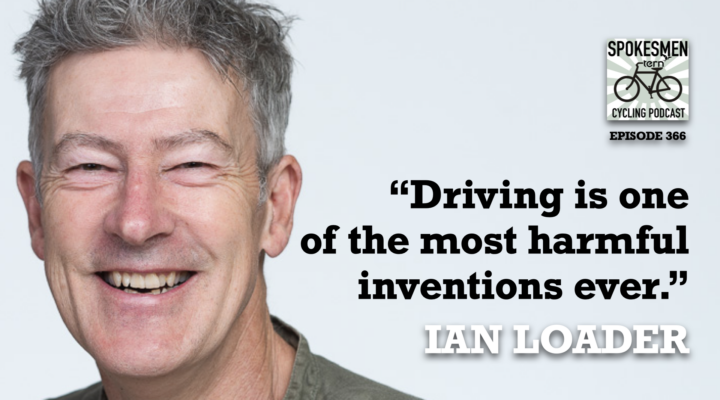
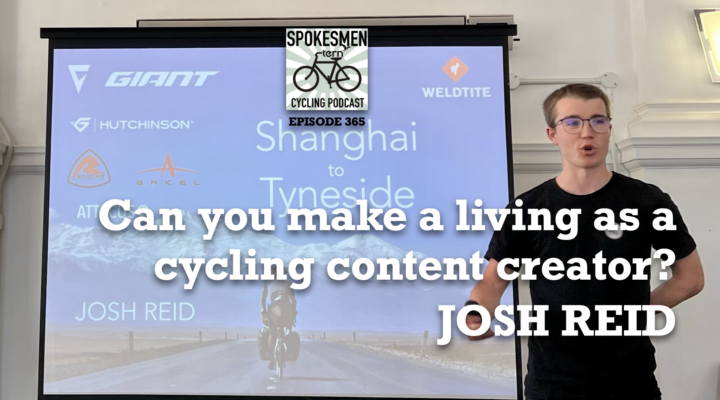
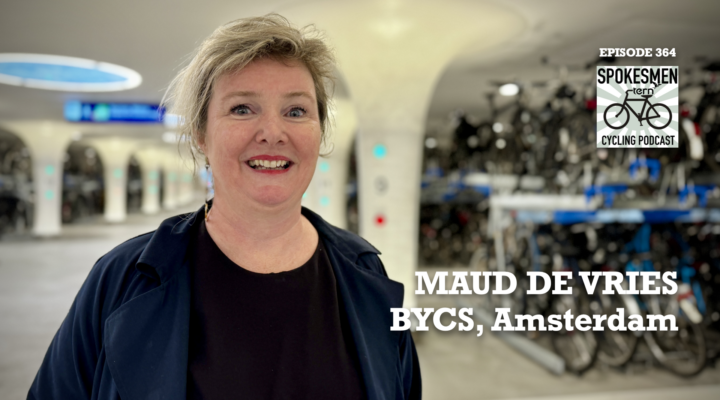
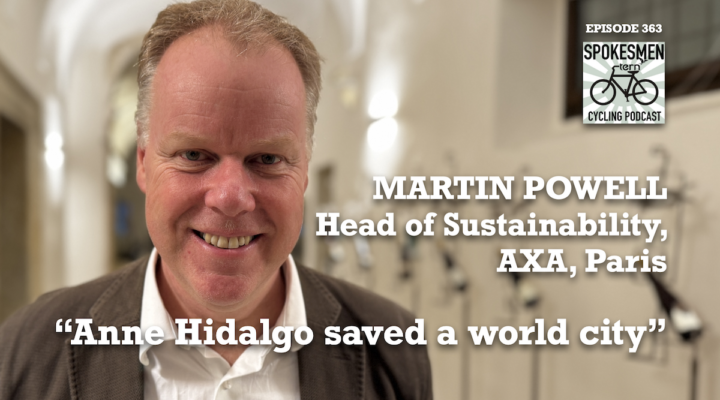
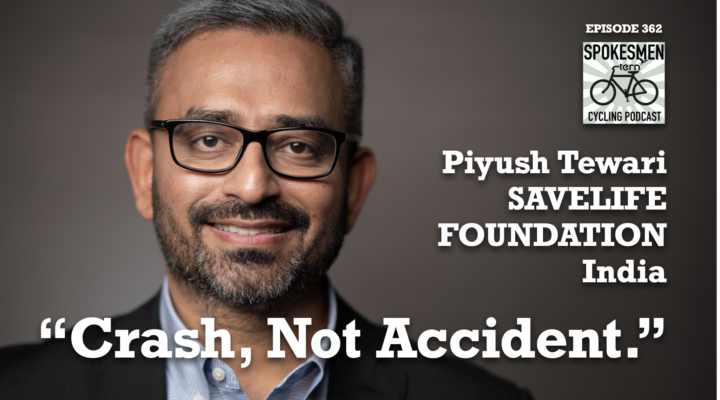

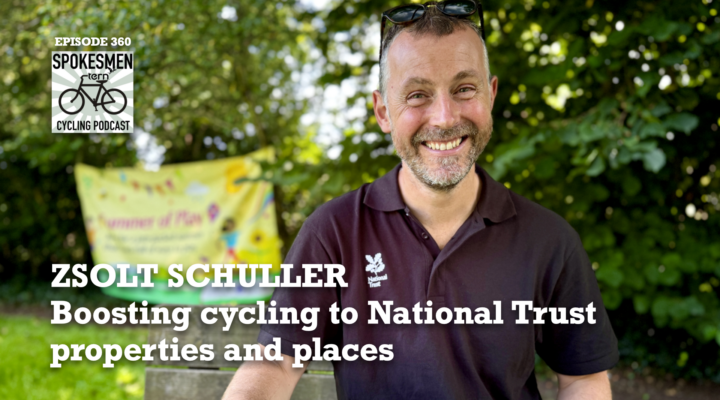
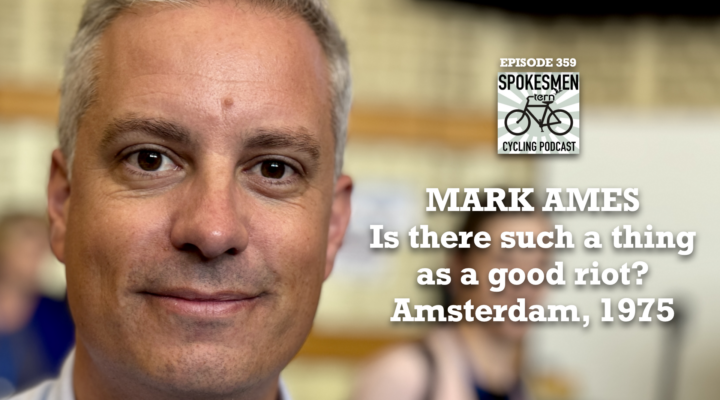
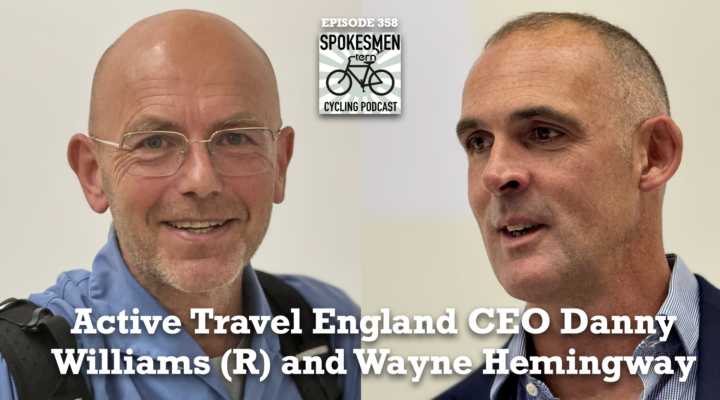
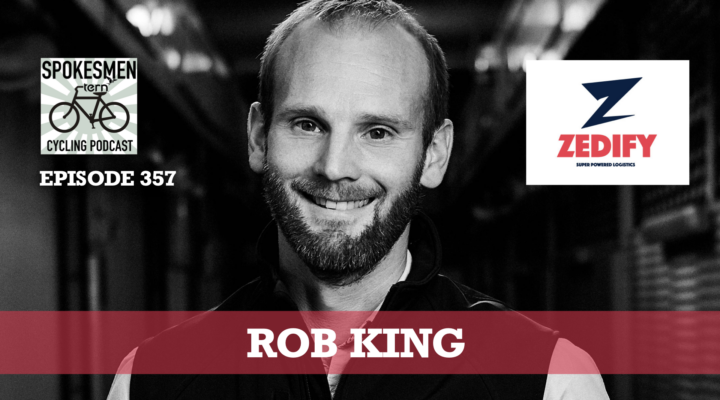



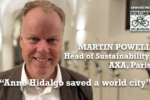






Be First to Comment